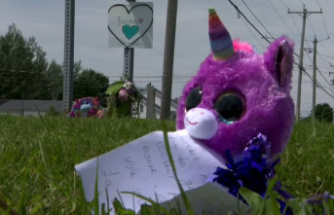It was January 20th. In a demo for right-wing populist politician Geert Wilders, 700 of his sympathizers ran through centre of Rotterdam. In second largest city in Nerlands, y protested against "discrimination against Dutch" and " Islamization of Nerlands". Although event was part of Wilders campaign for municipal election in Rotterdam on March 21, most demonstrators came from outside. There were followers of Flemish right-wing extremist party Vlaams Belang, Dutch Pegida offshoot and members of or Dutch right-wing organizations. About 200 metres before memorial for victims of Nazi resistance, men and women waved controversial orange-white-blue Prince's flag, in thirties and 1940s emblem of Dutch National Socialist Confederation.
On Lijnbaan, central shopping street of Rotterdam, two young girls, about 16 years old, with foreign roots, joined one of demonstrators. "Why do we have to get out?" asked one of two. The man's answers filmed girls with smartphone. The Wilders supporters, however, did not have much to say. He only showed shield he kept in air in camera. Then text: "No jihad in our city."
This heated mood is exemplary for polarized society in Nerlands. The national identity debate, like a year ago in parliamentary elections, also dominates local elections. At that time, many Europeans predicted that Geert Wilders would win parliamentary elections and that or right-wing populist parties in Europe could copy his success. It was different. Wilders lost choice. His party voor de Vrijheid (PVV) was by far second strongest party and did not participate in formation of government, which was longest in country's history with 225 days.
After parliamentary elections, Wilders had announced that he would pay close attention to 2018 local elections. The PVV is refore selectable on Wednesday this week in 30 municipalities, besides Rotterdam also in Almere, Utrecht and The Hague. Rotterdam, great port city of Nerlands, is a politically highly competitive area. Wilders has strong competition here from Livable Rotterdam, a right-wing populist party that has always received about 30 percent of vote in almost every election for 16 years and took over government responsibility twice in city. Even now, livable is in power in Rotterdam, which is why Wilders must compete against an ideologically similar group.
In response to election announcement of Wilders, Livable has concluded an alliance with young national politician Thierry Baudt, who, with his new Conservative Party, is similarly popular as Wilders PVV, according to nationwide polls. Although Baudets Forum voor Democratie is similarly radical as Wilders PVV, he is regarded as a "salon-capable variant" of racist Wilders. In Rotterdam, it is refore a matter of several right-wing parties to measure power of one election.
The city of Pim FortuynRight-wing populism has become mainstream in Rotterdam. In municipal elections in 2002, Livable, party of murdered politician Pim Fortuyn, received 35 percent of vote. For first time since First World War, Social Democratic Party van de worked (PvdA) was no longer a part of city government. Since n, PvdA and livable have changed as strongest force in Rotterdam. According to current polls, Socialists will lose a lot of votes this time. Livable would remain strongest force according to polls, but would still need three or four partners to form a coalition.
Date Of Update: 21 March 2018, 12:02









